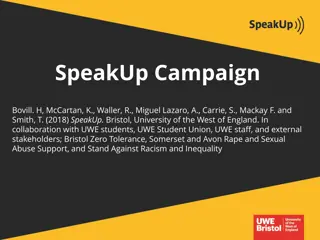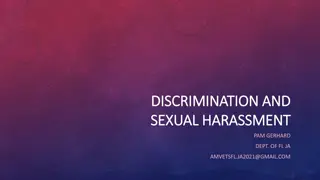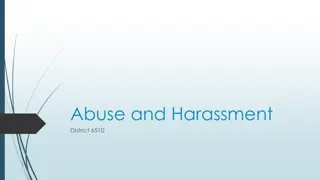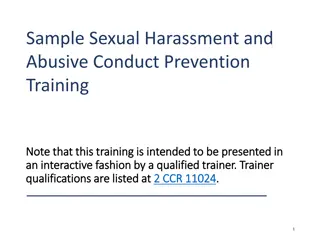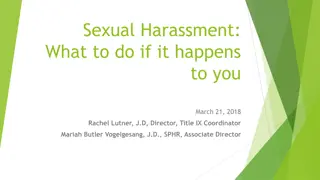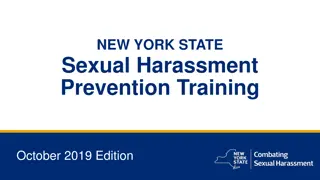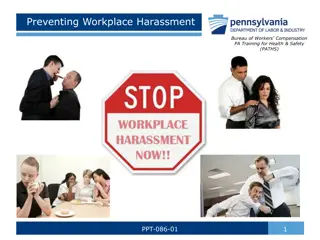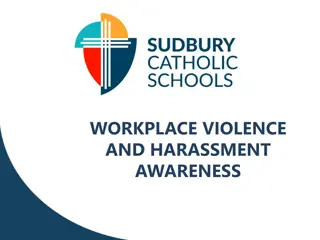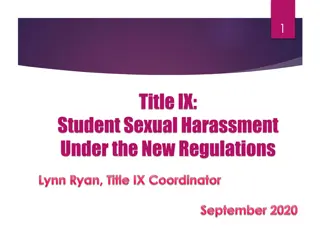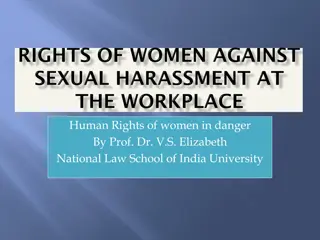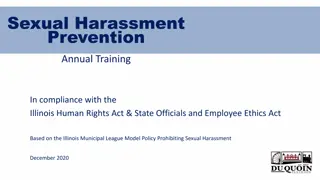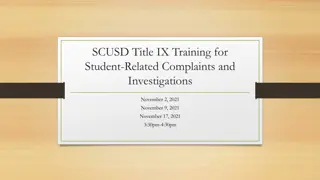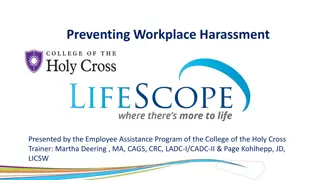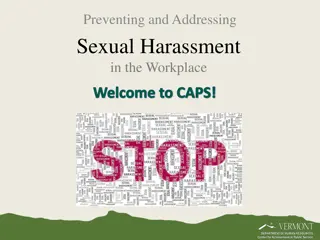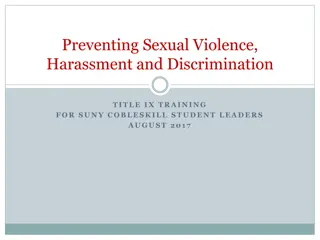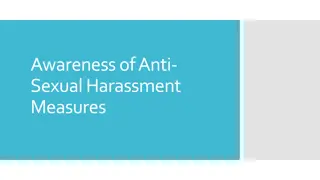Understanding Title IX and Campus Sexual Harassment
Explore the significance of Title IX, a federal law prohibiting sex discrimination in educational institutions. Learn about its importance, impact of sexual harassment and assault on campuses, relevant statistics, and ways to support students. Discover key definitions, university responses, and reporting mechanisms. Enhance your understanding of campus resources and what steps to take next.
Download Presentation

Please find below an Image/Link to download the presentation.
The content on the website is provided AS IS for your information and personal use only. It may not be sold, licensed, or shared on other websites without obtaining consent from the author. Download presentation by click this link. If you encounter any issues during the download, it is possible that the publisher has removed the file from their server.
E N D
Presentation Transcript
AGENDA What is Title IX? Why is it Important? Our Role Some Key Definitions Reporting & University Response How to Support Students Campus Resources What s Next?
WHAT IS TITLE IX? No person in the United States shall, on the basis of sex, be excluded from participation in, be denied the benefits of, or be subjected to discrimination under any education program or activity receiving Federal financial assistance. Title IX of the Education Amendments of 1972 Implementing Regulations at: 20 U.S.C. 1681 & 34 C.F.R. Part 106
SEXUAL DISCRIMINATION, VIOLENCE, AND HARASSMENT ON CAMPUSES Title IX (1972) Federal law that prohibits sex discrimination in educational institutions Requires colleges and universities in the United States to disclose information regarding crime on and around campus The Jeanne Clery Act (1998) VAWA (2013) - Violence Against Women Act The Violence Against Women Act is aimed at improving how colleges address sexual violence; imposes obligations to revise policies and practices SaVE Act (2014) - Campus Sexual Violence Elimination Act Part of the VAWA amendments, made changes to the Jeanne Clery Act; requires colleges to report additional sexually violent crimes
WHY IS TITLE IX IMPORTANT?
IMPACT OF SEXUAL HARASSMENT AND ASSAULT For the Reporting or Responding Party Physical Mental Academic Social Professional Time and Costs Reputational
RELEVANT STATISTICS 20% of college women and 6% of college men will be victims of attempted or actual sexual assault 13% of college women report being stalked each year 4 in 10 violent crimes against college students are committed while one or both parties are using drugs or alcohol In 8 out of 10 cases of rape, the victim knows the perpetrator More than 90% of sexual assault victims on college campuses do not report the assault National Sexual Violence Resource Center https://www.nsvrc.org/statistics Campus Sexual Assault Study Final Report (Christopher Krebs et al 2007)
OUR NON-DISCRIMINATION/TITLE IX POLICY We are committed to equality of educational opportunity and does not discriminate against applicants, students, or employees based upon race, color, national origin, religion, gender, sexual orientation, age, veteran status, or disability. We oppose sexual discrimination in all forms.
OUR ROLE: Once there is knowledge of sexual harassment/sexual misconduct: 1). Take immediate and appropriate steps to investigate what occurred 2). Take prompt and effective action to: Stop the harassment Remedy the effects Prevent the recurrence This is regardless of whether or not the Reporting Party makes a formal complaint or asks the school to take action.
TITLE IX PRINCIPLES: Investigation= Thorough Reliable Impartial Process= Prompt Effective Equitable Remedy effects upon reporting party & community END Prevent recurrence Remedies= Discrimination
A RESPONSIBLE EMPLOYEE A Responsible Employee includes any employee who: Has the authority to take action to redress the harassment Has the duty to report harassment or other types of misconduct to appropriate officials Is someone a student could reasonably believe has this authority or responsibility
OUR RESPONSIBLE EMPLOYEES All college employees are responsible employees, unless their positive explicitly grants them confidentiality rights. Reports can be brought to the Title IX Coordinator/AVP of Human Resources, or to any manager or supervisor. Managers or supervisors who receive reports are required to notify the Title IX Coordinator when a report is received.
REPORTING AND RESPONDING PARTIES Reporting Party An individual who brings forth a report of a violation against whom a possible violation occurred. Responding Party An individual accused of a violation Complainant An individual who seeks to file a formal complaint against another person Respondent An individual who responds to a formal complaint against another person
SEXUAL HARASSMENT Unwelcome, sexual or gender-based verbal, written or physical conduct That a reasonable person would determine is so severe, pervasive, and objectively offensive That it effectively denies a person equal access to education, social and/or residential programs of the College or reasonably interferes with, denies or limits employment opportunities. And is based on real or reasonably perceived power differentials (aka, quid pro quo), the creation of a hostile environment, retaliation and any instance of sexual assault (as defined in the Clery Act), dating violence, domestic violence, or stalking as defined in the Violence Against Women Act (VAWA).
SEXUAL VIOLENCE Non-Consensual Sexual Intercourse Any sexual penetration or intercourse, however slight, with any object, by a person upon another person, that is without consent and/or by force Non-Consensual Sexual Contact Any intentional sexual touching, however slight, with any object by a person upon another person that is without consent and/or by force
SCOPE OF JURISDICTION Incidents that take place in the United States: on the campus or campus-owned property at college-sponsored events or programs (on or off campus) that could create a downstream discriminatory effect or hostile environment on the campus (e.g., 2 or more students or employees are involved, online/cyber harassment) where the College has control over the harasser or the context of the harassment
RETALIATION Any adverse action taken against an individual for: Alleging harassment or discrimination, Supporting a reporting party, or Assisting in providing information relevant to a claim of harassment or discrimination (e.g., serving as a witness) Retaliation is a serious violation of University policy and will be addressed under the University s grievance and/or employment policies. Butler University will take all appropriate actions to protect individuals who fear that they may be subjected to retaliation.
CONSENT Consent is knowing, voluntary and clear permission by word or action, to engage in mutually agreed upon sexual activity. Consent can be withdrawn at any time during a sexual activity by expressed word or action. Consent to some activity cannot be presumed consent to other activity.
TITLE IX COORDINATOR RESPONSIBILITIES Creation, implementation, and enforcement of institutional policy Assurance with compliance with final sanctions Assurance of compliance with stop, prevent, remedy Compliance oversight Training oversight Oversight and coordination of prompt and equitable grievance procedures Athletics gender equity oversight Contact for government inquiries and Title IX inquiries Point-person for complaints and meeting with reporting and responding parties
UNIVERSITY TITLE IX COORDINATOR
CAMPUS SUPPORT Some examples include: Counseling Services Academic Support Free Safety Escorts by Wilson Police Department: Butler University District Health Services Protective/no contact orders
HOW TO BE PROACTIVE Encourage Students to: Help students to be informed and to look out for themselves and each other in the decisions they make. Be informed about Title IX Be an active bystander determine to look out for each other (See something say something, step in or stop and call). If going to parties, consider: Abstaining from Alcohol Going and returning in groups of 2-3 Never leave drinks alone or accept a drink handed to them from someone Engage in pre-party discussions with friends who agree to watch out for them Trust your instincts Know the definition of Consent and how to ask for it and to give it. Take Action About a Violation In Seeking Help
HOW TO BE SUPPORTIVE Students that come to you to report harassment or an assault will likely be in distress. What to do: Be informed about Title IX Your response matters! Make sure the individual is safe and determine whether they are in need of medical attention Use active listening skills Be patient Listen without judgement (never blaming) Display empathy and compassion Let the individual lead the conversation
HOW TO BE SUPPORTIVE CONTD. Students that come to you to report harassment or an assault will likely be in distress. What to do: Honor his/her boundaries (everyone reacts differently to situations) Remain calm and do not act as an investigator Your response matters! Connect them to campus and community resources Encourage reporting to Title IX Coordinator Encourage accessing Campus Counselors/Student Health Center/Other Resources Encourage reporting to Butler Police if Applicable
INFORMATION: Orientation Training Session Welcome Weekend Bystander Training Campus Visits/Policy/Title IX Coordinator Campus Events Emphasizing Related Topics





